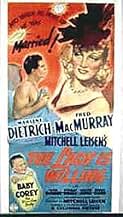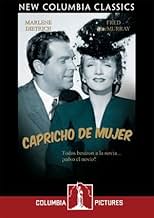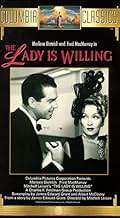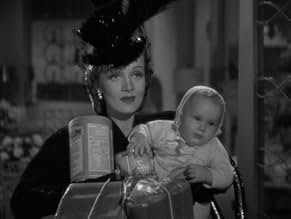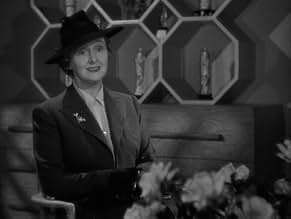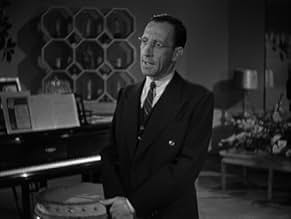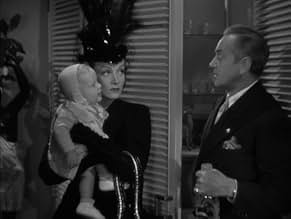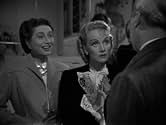CALIFICACIÓN DE IMDb
6.3/10
857
TU CALIFICACIÓN
Para adoptar a un bebé abandonado, una actriz organiza un matrimonio de conveniencia con un médico.Para adoptar a un bebé abandonado, una actriz organiza un matrimonio de conveniencia con un médico.Para adoptar a un bebé abandonado, una actriz organiza un matrimonio de conveniencia con un médico.
- Dirección
- Guionistas
- Elenco
Eddie Acuff
- Patrolman Murphy
- (sin créditos)
Ernie Adams
- Doorman
- (sin créditos)
Helen Ainsworth
- Interior Decorator
- (sin créditos)
Opiniones destacadas
THE LADY IS WAITING (Columbia, 1942), under the direction of Mitchell Leisen, pairs Marlene Dietrich (on loan from Universal) and Fred MacMurray (from Paramount) for the only time. Nearly forgotten, and bearing no relation to the 1934 British-made movie of the same name starring Leslie Howard, the film itself offers the diverse Dietrich an opportunity to perform in light comedy far removed from the type of characters she's played during her early Paramount years (1930-1935), especially those under the stern direction of Josef Von Sternberg or those re-inventive offerings from Universal (1939-42) that all began with the classic western, DESTRY RIDES AGAIN (1939). For MacMurray, it's another range for his talent playing a no-nonsense pediatrician who happens to detest babies, yet the same actor who made fathering his career in later years, especially the long running TV series, "My Three Sons" (1960-72).
As the opening credits present itself through passages taken from a theater program guide, the story introduces Elizabeth "Liza" Madden (Marlene Dietrich), a celebrated New York entertainer leaving the stage door entrance and approached by awaiting fans wanting her autograph. Minutes later, she's seen returning to her luxurious East 85th Street apartment holding a baby (David James) she found abandoned in a 47th street rooming house, much to the astonishment of her personal secretary, Buddy (Aline MacMahon), and Kenneth Harling (Stanley Ridges), her business representative. Since the infant is dressed in pink, and taking it for granted to be a girl, she names her Joanna. Elizabeth learns different after notifying Doctor Corey T. McBain (Fred MacMurray), a baby doctor, who, following an examination, tells her it's a boy. Re-naming him Corey, Elizabeth goes through whatever channels she could to adopt the infant. While Mrs. Cummings (Elisabeth Risdon) of the child welfare department agrees on letting her keep the baby until she can further look into the matter regarding its parents, in the meantime, Liza must also prove herself solvent and married. Choosing McBain as her marriage of convenience husband, she readily relocates herself into a larger apartment so McBain, having given up his practice, could have enough room for his experiments studying the blood stream of rabbits for his cure for pneumonia, and Little Corey, called "Butch" by the McBain, to have his very own nursery. As these two strangers slowly grow fond of one another, situations occur as Liza encounters Frances (Arline Judge), McBain's fortune hunting ex-wife living in the same building, and the arrival of the baby's parents (Murray Alper and Kitty Kelly) and their lawyer (Charles Lane) who, seeing how the lady is willing, agree in letting Liza keep the child for $25,000.
Although simply a movie more for amusement than logic, it's sometimes hard accepting the Dietrich character being so naive. It's a wonder she wasn't arrested for taking the infant without learning the circumstances of its abandonment. Possibly the screenplay should have gone through the cliché channels of having her suddenly acquiring the infant from a recently deceased relative or close friend of the theater. Either way would have proved more acceptable for the viewer. Though Dietrich had already played a mother earlier in BLONDE VENUS (Paramount, 1932), parenting was nothing new to her at this point. Her Elizabeth Madden, portrayed as a little eccentric and at one point advised to see a psychiatrist, may be a little out of her character range, though being a musical comedy star fits Dietrich to perfection. Similar circumstances for a woman like Dietrich being past 40 would have been better suited for an actress in the younger age range as Lana Turner or a Rita Hayworth. Dietrich's stubbornness and fiery temper, however, comes as a reminder of Mexican spitfire Lupe Velez. She gets some laughs in her favor as being one with a reputation for wearing screwy hats, though she's a fashion model here through her assortment of fur coats and jewelry.
Taken from an original story by John Edward Grant, areas of THE LADY IS WILLING seems to have been inspired by the witty comedy of BACHELOR MOTHER (RKO Radio, 1939) starring Ginger Rogers as a department store worker who takes in a baby found on a doorstep. With BACHELOR MOTHER being straightforward comedy, THE LADY IS WILLING is a mild blend of comedy-drama. Though the comedy angle is much more preferable, the dramatic portion is fortunately handled well without becoming disastrous. Two staged interludes to a song, "I Find Love" (by Jack King and Gordon Clifford) sung by Dietrich, are showcased, with Roger Clark acting as her dancing partner. Others members of the cast include: Marietta Canty (Mary Lou, the maid); Ruth Ford (Myrtle Gusselman, a Swedish maid actually from the Bronx); Eddie Acuff (Officer Murphy); Harry Shannon (Detective Sergeant Barnes); and Harvey Stephens (Doctor Golding). Though some sources credit Sterling Holloway in the movie as Arthur Miggle, his scenes are not visible in the final print.
Distributed to home video in 1994, THE LADY IS WILLING has turned up occasionally on TV Turner Classic Movies cable channel since August 9, 2008. Though an unlikely pair, the contrasting screen personalities of Dietrich and MacMurray do compliment each other, surely making this overlooked comedy, whenever shown on TV, a pleasing 90 minute experience for any classic movie lover. (***)
As the opening credits present itself through passages taken from a theater program guide, the story introduces Elizabeth "Liza" Madden (Marlene Dietrich), a celebrated New York entertainer leaving the stage door entrance and approached by awaiting fans wanting her autograph. Minutes later, she's seen returning to her luxurious East 85th Street apartment holding a baby (David James) she found abandoned in a 47th street rooming house, much to the astonishment of her personal secretary, Buddy (Aline MacMahon), and Kenneth Harling (Stanley Ridges), her business representative. Since the infant is dressed in pink, and taking it for granted to be a girl, she names her Joanna. Elizabeth learns different after notifying Doctor Corey T. McBain (Fred MacMurray), a baby doctor, who, following an examination, tells her it's a boy. Re-naming him Corey, Elizabeth goes through whatever channels she could to adopt the infant. While Mrs. Cummings (Elisabeth Risdon) of the child welfare department agrees on letting her keep the baby until she can further look into the matter regarding its parents, in the meantime, Liza must also prove herself solvent and married. Choosing McBain as her marriage of convenience husband, she readily relocates herself into a larger apartment so McBain, having given up his practice, could have enough room for his experiments studying the blood stream of rabbits for his cure for pneumonia, and Little Corey, called "Butch" by the McBain, to have his very own nursery. As these two strangers slowly grow fond of one another, situations occur as Liza encounters Frances (Arline Judge), McBain's fortune hunting ex-wife living in the same building, and the arrival of the baby's parents (Murray Alper and Kitty Kelly) and their lawyer (Charles Lane) who, seeing how the lady is willing, agree in letting Liza keep the child for $25,000.
Although simply a movie more for amusement than logic, it's sometimes hard accepting the Dietrich character being so naive. It's a wonder she wasn't arrested for taking the infant without learning the circumstances of its abandonment. Possibly the screenplay should have gone through the cliché channels of having her suddenly acquiring the infant from a recently deceased relative or close friend of the theater. Either way would have proved more acceptable for the viewer. Though Dietrich had already played a mother earlier in BLONDE VENUS (Paramount, 1932), parenting was nothing new to her at this point. Her Elizabeth Madden, portrayed as a little eccentric and at one point advised to see a psychiatrist, may be a little out of her character range, though being a musical comedy star fits Dietrich to perfection. Similar circumstances for a woman like Dietrich being past 40 would have been better suited for an actress in the younger age range as Lana Turner or a Rita Hayworth. Dietrich's stubbornness and fiery temper, however, comes as a reminder of Mexican spitfire Lupe Velez. She gets some laughs in her favor as being one with a reputation for wearing screwy hats, though she's a fashion model here through her assortment of fur coats and jewelry.
Taken from an original story by John Edward Grant, areas of THE LADY IS WILLING seems to have been inspired by the witty comedy of BACHELOR MOTHER (RKO Radio, 1939) starring Ginger Rogers as a department store worker who takes in a baby found on a doorstep. With BACHELOR MOTHER being straightforward comedy, THE LADY IS WILLING is a mild blend of comedy-drama. Though the comedy angle is much more preferable, the dramatic portion is fortunately handled well without becoming disastrous. Two staged interludes to a song, "I Find Love" (by Jack King and Gordon Clifford) sung by Dietrich, are showcased, with Roger Clark acting as her dancing partner. Others members of the cast include: Marietta Canty (Mary Lou, the maid); Ruth Ford (Myrtle Gusselman, a Swedish maid actually from the Bronx); Eddie Acuff (Officer Murphy); Harry Shannon (Detective Sergeant Barnes); and Harvey Stephens (Doctor Golding). Though some sources credit Sterling Holloway in the movie as Arthur Miggle, his scenes are not visible in the final print.
Distributed to home video in 1994, THE LADY IS WILLING has turned up occasionally on TV Turner Classic Movies cable channel since August 9, 2008. Though an unlikely pair, the contrasting screen personalities of Dietrich and MacMurray do compliment each other, surely making this overlooked comedy, whenever shown on TV, a pleasing 90 minute experience for any classic movie lover. (***)
Love classic film and there are many great to classic romantic comedy. Fred MacMurray was a very watchable actor and showed charm and great comic timing more than once. Marlene Dietrich was always luminous on screen, the camera clearly loving her, and always a magnetic presence, especially in her films with Josef Von Sternberg.
Both MacMurray and Dietrich did better than 'The Lady is Willing' in their long and distinguished careers. More the film themselves than their performances, which actually come off well with plenty of the assets that were particularly appealing. 'The Lady is Willing' is still a decent film with a lot to love. It is also an uneven film that loses its way. Can definitely see why some remember it fondly, why some like it but have reservations and why it doesn't work for others.
'The Lady is Willing' is one of those films that starts off very well. It is mostly very successful in the comedic and romantic elements. While silly in spots, the comedy was sophisticated, witty and humorous. The romantic element sparkled and charmed and the script is snappy.
It looks great too, with it being beautifully shot and the production and costume design are elegant sophistication personified. The direction is glossy and keeps things moving, while not always being inspired. The music fits decently enough and serves its purpose. MacMurray is amusing and charming in a role that fits him like a perfectly fitted glove and Dietrich is as ever luminous and makes a potentially bothersome character likeable. They play off each other well while appealing as a couple. Aline MacMahon and Stanley Ridges sparkle in support, MacMahon particularly.
With this amount of promise, it is a shame that 'The Lady is Willing' wasn't better. It is let down by the more dramatic elements and latter parts of the film. The melodramatic change of tone just jars uneasily, the melodrama coming over as overwrought soap-opera, while the ending is more maudlin than it is touching and the pace loses lustre.
On the most part, the story is flimsy, and that's an understatement, parts being truly dumb and at times bizarre, giving an air of contrivance. The rest of the supporting cast are competent but don't stand out enough.
Summarising, uneven but decent. 6/10 Bethany Cox
Both MacMurray and Dietrich did better than 'The Lady is Willing' in their long and distinguished careers. More the film themselves than their performances, which actually come off well with plenty of the assets that were particularly appealing. 'The Lady is Willing' is still a decent film with a lot to love. It is also an uneven film that loses its way. Can definitely see why some remember it fondly, why some like it but have reservations and why it doesn't work for others.
'The Lady is Willing' is one of those films that starts off very well. It is mostly very successful in the comedic and romantic elements. While silly in spots, the comedy was sophisticated, witty and humorous. The romantic element sparkled and charmed and the script is snappy.
It looks great too, with it being beautifully shot and the production and costume design are elegant sophistication personified. The direction is glossy and keeps things moving, while not always being inspired. The music fits decently enough and serves its purpose. MacMurray is amusing and charming in a role that fits him like a perfectly fitted glove and Dietrich is as ever luminous and makes a potentially bothersome character likeable. They play off each other well while appealing as a couple. Aline MacMahon and Stanley Ridges sparkle in support, MacMahon particularly.
With this amount of promise, it is a shame that 'The Lady is Willing' wasn't better. It is let down by the more dramatic elements and latter parts of the film. The melodramatic change of tone just jars uneasily, the melodrama coming over as overwrought soap-opera, while the ending is more maudlin than it is touching and the pace loses lustre.
On the most part, the story is flimsy, and that's an understatement, parts being truly dumb and at times bizarre, giving an air of contrivance. The rest of the supporting cast are competent but don't stand out enough.
Summarising, uneven but decent. 6/10 Bethany Cox
Engaging comedy with Fred and Marlene well matched and looking glamorous and gorgeous. As was her usual state Marlene is gowned in one eye popping creation after another with some extraordinary hats. She's loaded with gossamer charm as an actress who longs for motherhood and is suddenly presented with answered prayers. Endearing in her befuddlement of the simplest basics of children, including finding out whether the baby she's taken under her wing is a boy or a girl!, she still comes across as a sincerely sweet and loving person. Fred is all gruff exterior at first but his innate joviality soon shows through. The picture takes an unnecessary detour into melodrama towards the end but snaps out of it for a proper ending. A cute and frothy film with Aline MacMahon contributing a fun performance as Marlene's right hand woman.
Part of the premise of The Lady Is Willing is that the famous can get away with anything. Picture if you will yourself who while the police are investigating reports of a baby abandoned in a boardinghouse, just up and taking the infant. That would probably land you in jail for a stretch. But for Marlene Dietrich, famous musical comedy star, everyone is just forgiving as all heck and let's her keep the little tyke.
Everyone except the IRS who is insistence that she be solvent. Unmarried or not doesn't seem to be the issue. She owes a lot in income tax. So she persuades pediatrician Fred MacMurray to marry her. That would certainly save on doctor bills.
As for Fred who wouldn't want to marry Marlene? But when they enlarge their living quarters it's for cages for rabbits. MacMurray is doing research and needs them for experiments. He's also got an ex-wife sniffing around in the person of Arline Judge. She's more trouble than the rabbits.
The Lady Is Willing just will never be ranked as one of the 10 best for either Fred or Marlene. It makes so little use of MacMurray's comic talents which I find very strange. As for Marlene, there are times in the film when she comes across more like Doris Day.
Best in the film might possibly Marlene's girl Friday Aline McMahon. She has the film's best lines.
But fans of Fred and Marlene should like it well enough.
Everyone except the IRS who is insistence that she be solvent. Unmarried or not doesn't seem to be the issue. She owes a lot in income tax. So she persuades pediatrician Fred MacMurray to marry her. That would certainly save on doctor bills.
As for Fred who wouldn't want to marry Marlene? But when they enlarge their living quarters it's for cages for rabbits. MacMurray is doing research and needs them for experiments. He's also got an ex-wife sniffing around in the person of Arline Judge. She's more trouble than the rabbits.
The Lady Is Willing just will never be ranked as one of the 10 best for either Fred or Marlene. It makes so little use of MacMurray's comic talents which I find very strange. As for Marlene, there are times in the film when she comes across more like Doris Day.
Best in the film might possibly Marlene's girl Friday Aline McMahon. She has the film's best lines.
But fans of Fred and Marlene should like it well enough.
Wonderful 1942 film with Marlene Dietrich as a Broadway star who finds a baby and marries a pediatrician so that she can keep the baby. Of course, the story deals with them finding their way to love eventually as well as the situations they encounter such as phony parents showing up to take the child, and the doctor's first wife showing up to create further havoc.
Fred MacMurray is absolutely charming as the doctor and Dietrich showed how quite adept she was at comedy. Aline MacMahon co-stars as a wise-cracking assistant to Dietrich. This kind of role was normally assigned to Eve Arden.
Naturally, there is the end-of-film crisis where MacMurray has to operate and Dietrich sheds those tears. It's well worth it.
Fred MacMurray is absolutely charming as the doctor and Dietrich showed how quite adept she was at comedy. Aline MacMahon co-stars as a wise-cracking assistant to Dietrich. This kind of role was normally assigned to Eve Arden.
Naturally, there is the end-of-film crisis where MacMurray has to operate and Dietrich sheds those tears. It's well worth it.
¿Sabías que…?
- TriviaEarly in the shooting, Marlene Dietrich tripped while carrying child actor David James. She twisted her body to save the baby from striking the floor, but severely injured her right ankle in the fall, and her entire right leg had to be placed in a cast. That's why film she is always shown in full-length outfits (gowns, slacks, etc.) and just one shot of her unclothed leg is seen, and that is in shadow.
- ErroresAfter the date, when at home(at about 01:00:30), the glass and the bottle of milk exchange places in Fred MacMurray's hands when going to the baby's room from the kitchen.
- Créditos curiososThe film's title appears on a billboard; and the opening credits are printed in a theatrical program.
- ConexionesReferenced in Fantasmas en la noche (1944)
- Bandas sonorasI Find Love
Written by Jack King and Gordon Clifford
Sung by Marlene Dietrich (dubbed by Virginia Rees) (uncredited) and unidentified baritone
Selecciones populares
Inicia sesión para calificar y agrega a la lista de videos para obtener recomendaciones personalizadas
Detalles
- Tiempo de ejecución1 hora 32 minutos
- Color
- Relación de aspecto
- 1.37 : 1
Contribuir a esta página
Sugiere una edición o agrega el contenido que falta

Principales brechas de datos
By what name was La gloria de todos (1942) officially released in India in English?
Responda
